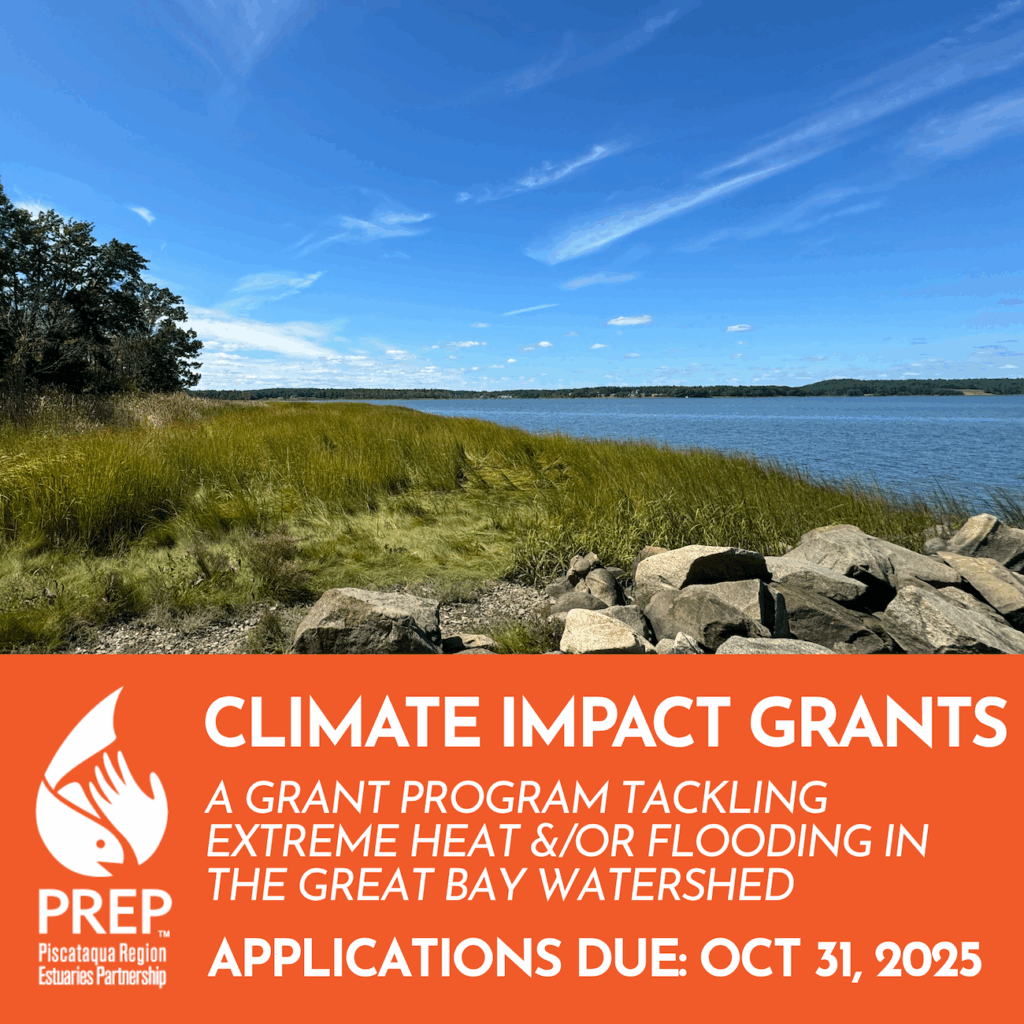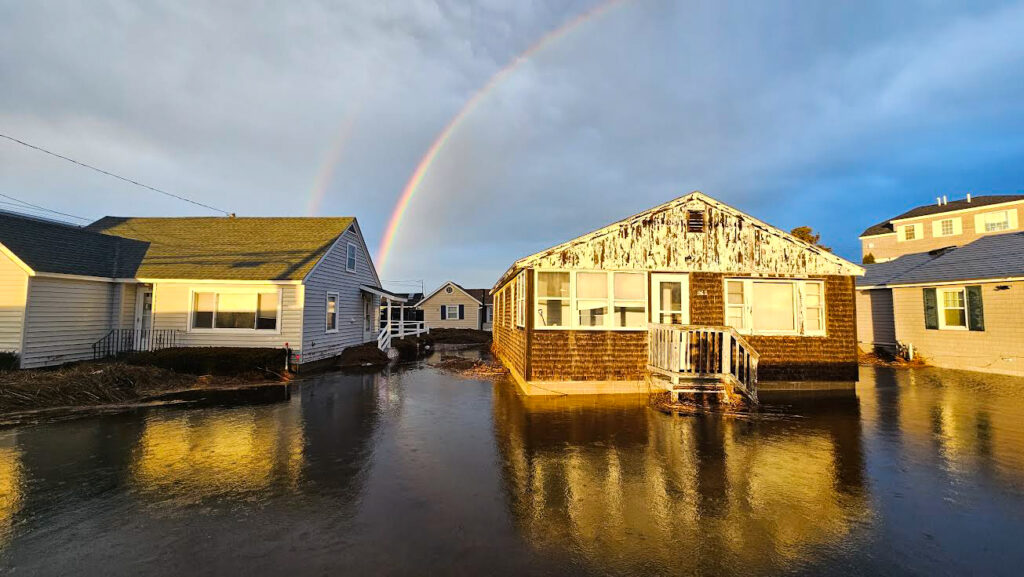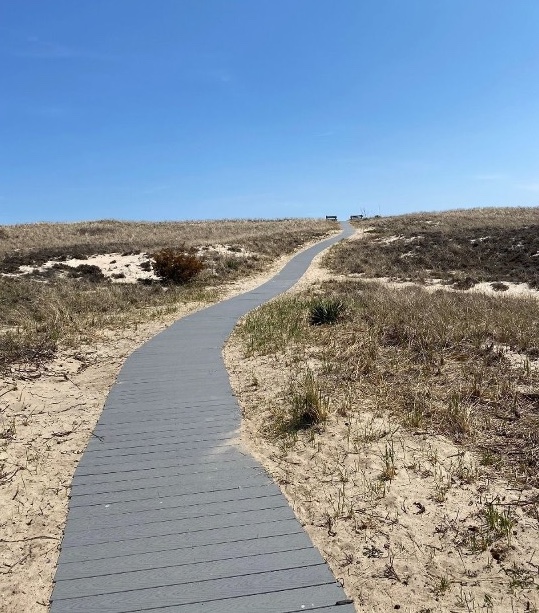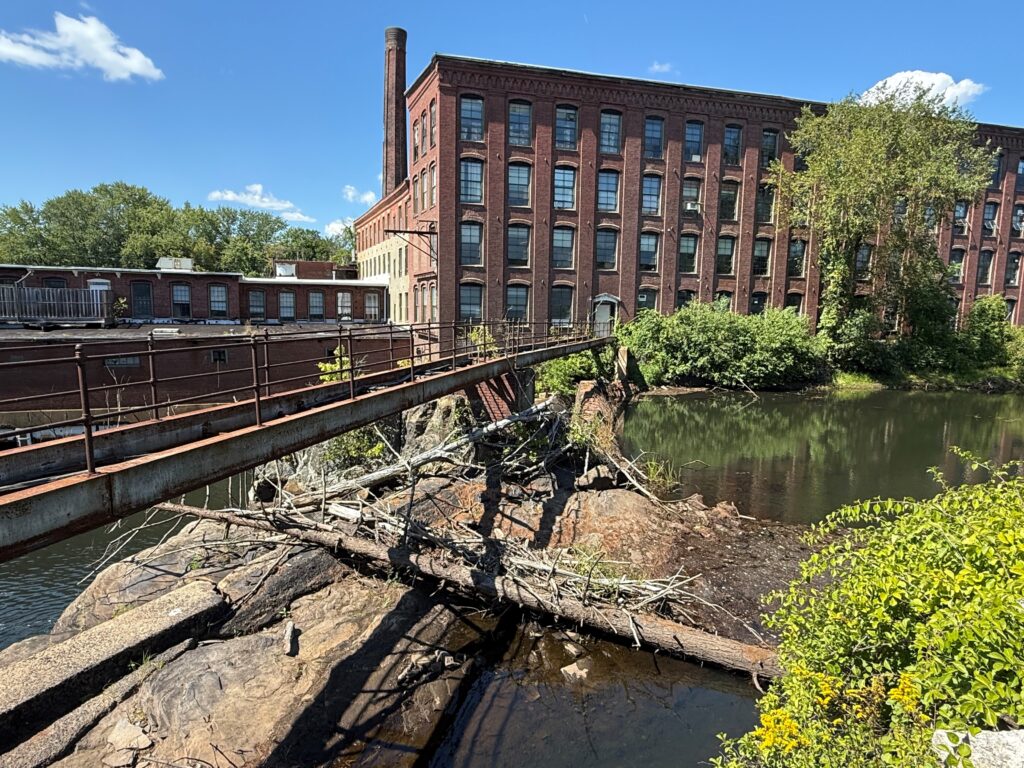Drought is a particularly top-of-mind climate impact at the moment, with much of seacoast NH in moderate drought and conditions in northern NH worsening to severe drought. This summer, we’ve seen some towns implement water restrictions and fire bans and other precautions. Farmers and water-based recreation companies have been adapting, too. Here are some relevant resources:
- Submit Condition Monitoring Observer Reports
- NHDES Drought Management resources
- Sign up for drought updates for your location
September is National Preparedness Month
The 2025 theme of National Preparedness Month is Preparedness Starts at Home. FEMA’s Ready.gov suggests four actions to prepare for disasters:
– Know your risk
– Make a family emergency plan
– Build an emergency supply kit
– Get involved in your community
Find more information and resources here. And find NH-specific resources for disaster preparedness at ReadyNH.gov. For flooding-specific strategies, check out ReduceFloodRisk.org. Preparing for disasters can feel daunting; focus on picking your one next step!

NH Coastal Flood Risk Summary Update
The NH Coastal Flood Risk Summary update is making exciting progress! The Part I: Science report is in design and will be published later this fall. The development of an updated Part II: Guidance for Using Best Available Science is underway, building on input shared via an online survey earlier this summer, feedback from the project’s Steering Committee, and input from Science Team members. Once a draft of the Guidance is available, there will be opportunities for public input as well. The Guidance will be published in 2026.
Visit the NHDES webpage for more information. Updates and notifications about the 2025-2026 Summary Update, public input opportunities and future training events will be posted on that webpage. If you would like to receive notifications, please email jennifer.r.gilbert@des.nh.gov and lisa.wise@unh.edu.
Funding Opportunities
PREP recently announced the launch of their new grant program: Climate Impact Grants! These grants provide up to $25,000 for community-led projects that address the impacts of extreme heat and/or flooding in the Great Bay Watershed. Projects must emphasize local action and strong community engagement to build climate resilience where it’s needed most. Applications are due October 31, 2025.
Whether you’re developing heat action plans, launching a community cooling campaign, tackling heat islands, piloting nature-based flood solutions, planting native vegetation to reduce both heat and flooding, or testing out another creative idea—PREP wants to hear from you. Climate Impact Grants are funded by the New Hampshire Charitable Foundation’s initiative, Great Bay 2030. More information and application materials are available at the link below. Contact Annie Cox from PREP: Anne.Cox@unh.edu, (603) 862-0219, or click here to schedule office hours with Annie.

Grants for Stewardship Costs in Coastal watershed
Grant applications are available for the Great Bay Resource Protection Partnership’s (GBRPP) Fall 2025 Stewardship Grant Program. The grants program assists with land stewardship costs for the permanently protected conservation lands in the Coastal Watershed area of New Hampshire and Maine. Stewardship activities supported by this grant program include habitat management, existing trail maintenance, property/project planning, and natural resource inventory projects. Projects that involve resource sharing or collaboration with partners/abutters on stewardship actions across property boundaries are encouraged. Eligible applicants include the fee owner or conservation easement holder of an eligible conservation property, including qualified nonprofit tax-exempt 501(c)(3) conservation organizations, municipalities and units of government.
Applications must be submitted by October 15, 2025. For questions about the grant program contact Dea Brickner-Wood at info@greatbaypartnership.org.
Seabrook-Hamptons Estuary Alliance (SHEA) Estuary Management Plan Small grants Program
SHEA invites applications to submit proposals for a new grant program that will fund projects from 2026-2028 that advance the goals and actions identified in the Hampton-Seabrook Estuary (HSE) Management Plan. Grants can be $5k-25k and 12-24 months in duration, starting in January 2026. Round 1 applications are due October 15, 2025. Multiple rounds of this grant funding are planned, with Round 2 applications due in March 2026. Questions? Reach out to HSE Collaborative Coordinator, Colette Tweeddale, at ctweeddale@shea4nh.org.
Other Funding & Assistance Opportunities
New Hampshire Clean Diesel Grant Program – rolling request for proposals due on the 20th of every month, until all funds have been obligated (projects must be completed by September 30, 2026) [link]
Granite State Clean Fleets Grant – rolling applications due the 30th of each month, until March 30, 2026, or earlier if all funds are obligated [link]
Local Source Water Protection Grant – due November 1, 2025 [link]
Request for Proposals: UNH Sustainability Dual Major Capstone Course Projects – Submit by November 1 for Spring 2026. Have a sustainability-related initiative or project idea that could help your department? Could you benefit from 3-4 highly motivated students working to move your sustainability initiative forward? Students in the sustainability dual major capstone class spend approximately 20 hours/week collectively from late January – May on your project. More information about past projects and project guidelines can be found in the Request for Proposals. Contact Erin.Hale@unh.edu to discuss your ideas.

Picturing Rising Tides: Save The Date!
November 5 – 8, 2025
Each year, CAW invites community members to photograph extreme high tides during its annual Picturing Rising Tides event, to raise awareness of New Hampshire’s rising tides. Photographing high tide flooding gives us a glimpse of what daily water levels could be like in the future. Stay tuned for more details about the 2025 Picturing Rising Tides event, planned around the expected high tides during November 5-8.
Image Credit: Erica Nardone
Upcoming Events
- September 18, 9am-12pm, Epping, NH: Benefits of Riparian Buffers workshop, hosted by the Southeast Land Trust [register]
- September 18, Hanover, NH: Local Solutions Conference – Bouncing Forward to Create Resilient Communities [register]
- September 23, Wakefield, NH: Salmon Falls Success Safari [register]
- September 25, Manchester, NH: NH Local Energy Solutions Conference [register]
- September 29, Newburyport, MA: When Insurance Markets Fail: Community Solutions for Climate-Threatened Homeowners [register]
- October 15, Portsmouth, NH: Are You Prepared for the Next Flood on the Seacoast? Organized by the NH Insurance Department [register]
- October 21, Newburyport, MA: Climate Change and Shellfishing: End of a Legacy or a New Beginning? [register]
- November 13, Portsmouth, NH: Community Resilience Course, offered by NH Division of Homeland Security and Emergency Management [register]
- November 20, Newburyport, MA: Protecting the Merrimack: Water Quality and Solutions [register]
Recent Project Deliverables
Seabrook Dune Walkway Evaluation Project:
In 2024, the Rockingham Planning Commission, in partnership with the Seabrook Hamptons Estuary Alliance (SHEA), UNH Extension/NH Sea Grant (UNHCE/NHSG), and the Town of Seabrook, secured a Coastal Resilience Grant from NHDES to conduct a comprehensive evaluation of Seabrook’s 18 beach and dune walkways. The project emerged from ongoing conversations with Seabrook residents about the need for improved structural walkways and safer access to the beach. This summer, the Project Team shared a final report for the project, as well as site profiles for each of Seabrook’s municipal dune walkways. Check out these products here.
[Image from final report]

Fairhill Salt Marsh Collaborative Restoration Project: Rockingham County Conservation District (RCCD) worked with several partners to review resiliency of the Fairhill salt marsh in Rye, NH. Recent restoration and monitoring efforts have shown a decline in vegetation, expansion of pools, and loss of favorable wildlife habitats. The NH Saltmarsh Plan (2023) ranked current conditions and vulnerability to sea level rise of all salt marshes in NH, highlighting the Fairhill marsh as having highly favorable conditions for marsh migration. During the project, RCCD gathered input from natural resource professionals, the local conservation commission, and interested community members. The project resulted in a preliminary restoration design, with mostly low-impact modifications using existing drainage structures in the marsh, as well as additional conservation practices to benefit the health of the salt marsh. NHDES Coastal Program put together a beautiful storymap walking through features of the Fairhill salt marsh. Explore it here! The final project report and appendices can be found here. This project was funded in part by the Great Bay 2030 initiative of the NH Charitable Foundation.
Newmarket Downtown Riverfront Master Plan Chapter & Charette: At a CAW meeting earlier this month, Newmarket Planner Bart McDonough and Liz Durfee from EF Design & Planning presented about the Town’s efforts to develop a master plan chapter focused on the downtown riverfront area, supported in part by a NHDES Coastal Resilience Grant. Resilience is one of the key themes of the chapter, with a variety of recommended actions to advance resilience in this part of the community. The Town had also engaged with Plan NH to host a charrette exercise to explore connectivity, access, and other improvement opportunities in the riverfront area. Check out the charrette report and draft Downtown Riverfront master plan chapter.
Other News & Resources
The two Gonic Dams on the mainstem Cocheco River in Rochester, NH, are slated to be removed – one this year, and one next year, following a long process of environmental engineering, permitting, and fundraising. The Sawmill Dam, the Gonic Dam and the Gonic Mill are owned by Steve Dumont of Dumont Property Group. Dumont said the project is now possible because a series of grants will cover the costs of the more than $2 million dam removal project. City Manager Katie Ambrose said the city helped Dumont get a $1.33 million state allocation of American Rescue Plan Act funds.
Ambrose said Dumont also has funding through the NHDES Aquatic Resource Mitigation (ARM), Great Bay 2030, and EPA 319/Watershed Assistance grants. Earlier this year, Peter Nourse, the City’s Public Works Director, reported the dams were built in the 1930s and both are in poor condition. He said efforts to remove them have been in discussion for 20 years, the main drivers being safety and ecological health. Kevin Lucey, Habitat Coordinator at the NH Department of Environmental Services indicated that the dam removal design and permitting process in Gonic was challenging because of unresolved ownership issues, the need to remove and properly dispose of contaminated river sediments, and an obligation to stabilize upstream municipal sewer infrastructure buried in the Gonic Sawmill Impoundment.
[Content adapted from this article]

The NH Department of Environmental Services (NHDES) Climate Pollution Reduction Grant (CPRG) project – This work includes the NH Comprehensive Climate Action Plan and rollout of a New England Heat Pump Accelerator program. Visit the NHDES CPRG website.
Clean Energy NH recently published an updated NH Model Solar Zoning Ordinance.
After Brief Delay, NOAA’s Atlas 15 Project Moves Ahead: NOAA has confirmed with ASFPM that they are moving forward on Atlas 15, both Volume 1 and Volume 2. Continuation of this project is important as NOAA Atlas 15 will become the authoritative source for precipitation frequency information across the United States. Read more
National Flood Insurance Program (NFIP) policy quoting tool: Wherever it can rain, it can flood. Many don’t realize that typical homeowner’s insurance does not cover flood damage. FEMA’s FloodSmart.gov website offers an online tool to generate quotes for NFIP policies. These quotes can be printed or sent to insurance agents. Note: Although D2C tool generates a quote without using an insurance agent, you should always talk with an agent. This way you can confirm you have the best coverage for you and inputted the correct information to obtain your quote. Learn more | Try the tool
What Are CAW Members Reading & Listening to?
Here’s a roundup of what some CAW members are reading and listening to lately. Have more recommendations for us? Please send them our way!
- “The Camp Gap – What We Can Learn from the Camp Mystic Tragedy,” Chad Berginnis, Executive Director of the Association of State Floodplain Managers (ASFPM), reflects on the devastating flooding that happened in Texas this summer.
- Time and Tide, NH Sea Grant’s new podcast – Check out the ‘Shoring up the Market’ episode on real estate intersections with flooding and coastal resources
- Say the Quiet Part Out Loud, Bina Patel
- Atmosphere, Taylor Jenkins Reid
- Educated, Tara Westover
- Raising Good Humans, Hunter Clarke-Fields
- “Stopping Pollution at its Roots: AWWA’s Push for Buffers and Pollution Control,” article on 7 Rivers to the Coast
This newsletter is brought to you by the NH Coastal Adaptation Workgroup, a collaboration of organizations working to assist communities in NH’s coastal watershed to prepare for the impacts of extreme weather and long-term climate change by providing resources, facilitation, and guidance that enhances readiness and resilience.
www.nhcaw.org
